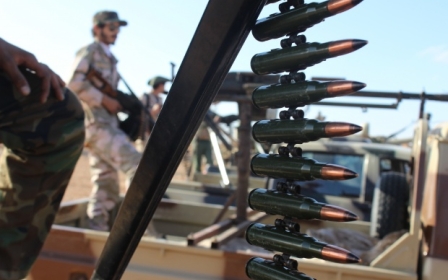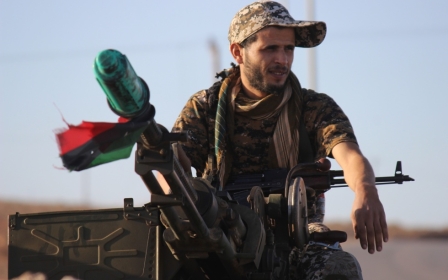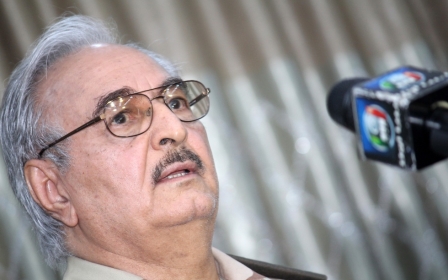In Benghazi, a fragile calm but residents fear army rule
BENGHAZI, Libya: After seven months of air raids, bombings and heavy fighting on the ground, ordinary life has slowly returned to Benghazi. The shops, banks, police stations and judiciary offices have reopened, and people have begun to move freely around Libya’s second city.
However, those who fought to “liberate” the city are now questioning the moves made by the latest victors who have steadily fought to win control of the city.
“Under [former strongman Muammar] Gaddafi we couldn’t live, under Ansar al-Sharia we lived afraid, but under the army we’re once again oppressed,” said Hassan, a soldier in Benghazi.
Hassan, who did not want to give his last name due to security concerns, fought against Gaddafi in 2011, and was also engaged in fighting at the beginning of this new war to free his city from groups like Ansar al-Sharia who are deemed a terrorist organisation by the US and have tried to enforce an ultra-conservative way of life in Benghazi since gaining strength in recent years.
“Most of Benghazi is now safe,” said the 33-year-old, who now works as an oil facility security guard. “But, you can’t speak against the army now in charge.
“You’re either with them or against them, you can’t criticise anything,” he added.
His fears have been replaced by concerns about what will become of his city and the rest of the country. “This is not the freedom people sought in 2011,” Hassan said.
Forces loyal to rogue ex-general Khalifa Haftar first began shelling Ansar al-Sharia and other militant groups whom they have dubbed “Islamists” and “terrorists” in May. While their so-called Operation Dignity initially made little progress, Haftar increasingly won military support from regular Libyan army units, and was eventually reintegrated back into the army late last month, which has helped the Haftar camp gain the upper hand.
Libya is currently split between the internationally-recognised, Tobruk-based House of Representatives, which is backed by Haftar and the army, and the Tripoli-based government that is partly made up representatives from the old parliament, the General National Congress (GNC.)
The Tripoli-based government and supporting militias have been slammed as “Islamist” by Haftar and Tobruk, whom they accuse of trying to reinstate Gaddafi’s old guard and signature iron fist rule.
While Benghazi was seen as the birthplace of the 2011 anti-Gaddafi revolution that broke out during the Arab Spring, groups like Ansar al-Sharia managed to proliferate there. They have since been linked to the murder and kidnapping of lawyers, police and army officers in the city. The militias are also thought to be behind the assassinations of 18-year-old activist Tawfiq Ben Saud, who was killed with his 17-year-old friend Sami Elkawafi this September.
Violent clashes
When these groups first began to take control of the city after the US embassy attack, locals did not welcome their presence and violent clashes took place between a militant brigade and residents of the city in June 2013. The residents were protesting against the brigade’s conduct and demanding the return of Libya’s official army and police. The protests quickly escalated. More than 30 civilian were killed.
“I agree these people had to be dealt with,” said Hassan, referring to the groups like Ansar al-Sharia that he feels terrorised his city. “But the army has in some cases taken things too far.”
He recalled a story of a family whose son was a member of Ansar al-Sharia. “They lit his house on fire one night,” said Hassan. The young man’s father, mother and nine-year-old sister were inside asleep.
“They all died. But what did they do to deserve that?” Hassan asked.
The army forces Hassan spoke about are loyal to Haftar, and while they have made inroads recently, the Tobruk-allied forces continue to faced fierce resistance, and seven months’ later, the canons are still being loaded and fired in the eastern port city.
The battles for supremacy is still ongoing near the port area in the north of Benghazi, and the western entrance to the city. Columns of black smoke rise on the northern front of Libya’s second city where fighting still rages, as Haftar’s men and army troops armed with assault rifles set up periodic roadblocks and checkpoints.
“People try to avoid heading out of their own district,” said Kareem, a 26-year-old resident of Benghazi’s Boatni district. His area is the location of the main army barracks and last month was the scene of serious fighting.
Anyone caught at a checkpoint and deemed to be out of their area was searched and questioned, as soldiers attempted to confirm the identity and allegiance of the person, explained Kareem.
This means that a 20-minute journey now takes up to an hour, as you can be pulled over at every checkpoint on your journey, questioned, and your car searched for weapons.
Security is even tighter after sunset, and very few people go out. “The situation is tense enough,” said Kareem. “And at night when it’s dark, soldiers will fire at anything they see as a threat to them.”
In some areas, no house stands unmarked; in others, houses barely stand because of the ruthless bombardment they have been subjected to. Hundreds have been left homeless. Many sought refuge with family members, in neighbouring towns and cities, or took up residence in schools specially prepared for families in safe areas away from the fighting, but conditions can be cramped and uncomfortable and little outside assistance has been getting through to help those in need.
Abdullah, his wife and three children are one of these families. Their “temporary home” as they call it is a school in Benina district south of Benghazi.
He used to live in A’Sabri, one of the few places in Benghazi still subject to heavy fighting between army and tribal forces loyal to Haftar, and militant groups such as Ansar al-Sharia, but has since been displaced.
“My house has been destroyed,” said Abdullah, angrily. “Apart from my family, it’s all I had.”
He believes that the army and anti-government militias are to blame for the massive destruction in A’Sabri. “They are both using very heavy weaponry in a densely populated area,” said Abdullah. “So many have lost their lives because of this war.”
A’Sabri is probably the worst affected area in this seven-month struggle for power and control of Benghazi. The streets leading to the district are completely shut off and, according to Colonel Ali in the Benghazi military operations room, no one but the army is allowed in.
“We have secured the city’s entrances and are slowly advancing inside Benghazi,” he said. “It’s a matter of weeks before we take full control of the city.”
For the growing disquiet about the military, there are still some who hotly anticipate this victory and welcome whatever order, Benghazi’s new lords may install.
In Sulmani district, Muhammed, a shopkeeper, praises the army and Haftar for their work, “I had to shut down my shop when Ansar were here,” he said. “Now my city is safe. I am safe, and with Haftar - Libya will be safe.”
Medical conveyer belt
In al-Jala, doctors are waging their own battle and the number of injured casualties is too high for the hospital’s staff to manage. The hospital used to be under the control of Ansar al-Sharia and, for months, Dr Haithem, who works in two clinics in the city, was forced to prioritise their injured.
“I’m a doctor, saving lives is my job,” he said, although Haithem and his colleagues have been criticised by some local residents who believe that they should have left the Ansar wounded for dead.
“I’m not a judge to decide someone’s fate,” he added resolutely.
Haithem said that medical supplies are running low, adding to the strain that medics are under.
“Everything else has closed down,” he said. “It’s just us [al-Jala] and the Benghazi Medical Center.”
Nowara is in charge of the busy emergency room, she said that up to 30 soldiers come in every day from the frontlines. The doctors do what they can but up to six die everyday, and many more are left with serious injuries as the facilities are basic and demand high.
Despite the odds, fighters are all still rushed to al-Jala before being transferred to the better-equipped Benghazi Medical Center. Another doctor, who would only call herself Nowara for security reasons and also worked with Ansar al-Sharia during their time in charge, said that she was tiered of the fighting.
“It’s difficult,” said Nowara. “We don’t have the capacity to treat these injuries.”
“This is Benghazi’s biggest emergency ward, and we don’t even have an MRI or CT scan to check internal injuries,” she explained.
Injury, however, no matter how grave seems to do little to quell the appetite for war.
One man who had been rushed in from A’Sabri after being shot by a sniper, who still had a bullet lodged in his abdomen but was expected to recover, said that he was itching to return to the fight.
“Just take it out already so I can go back [to the frontline],” the 26-year-old soldier from Benghazi told MEE while still lying in intensive care.
Yet others insist they have seen too much fighting the last few years to last them a lifetime.
Hassan, whose job is now to guard an oil field in Briga - 400km east of Benghazi - has refused to be dispatched to an active frontline, and said he would only fight if the facility he’s protecting comes under attack.
“I just don’t want all the people who have died in the past four years to have done so for nothing,” Hassan said. “I worry this is just a new military dictatorship.”
Middle East Eye propose une couverture et une analyse indépendantes et incomparables du Moyen-Orient, de l’Afrique du Nord et d’autres régions du monde. Pour en savoir plus sur la reprise de ce contenu et les frais qui s’appliquent, veuillez remplir ce formulaire [en anglais]. Pour en savoir plus sur MEE, cliquez ici [en anglais].




